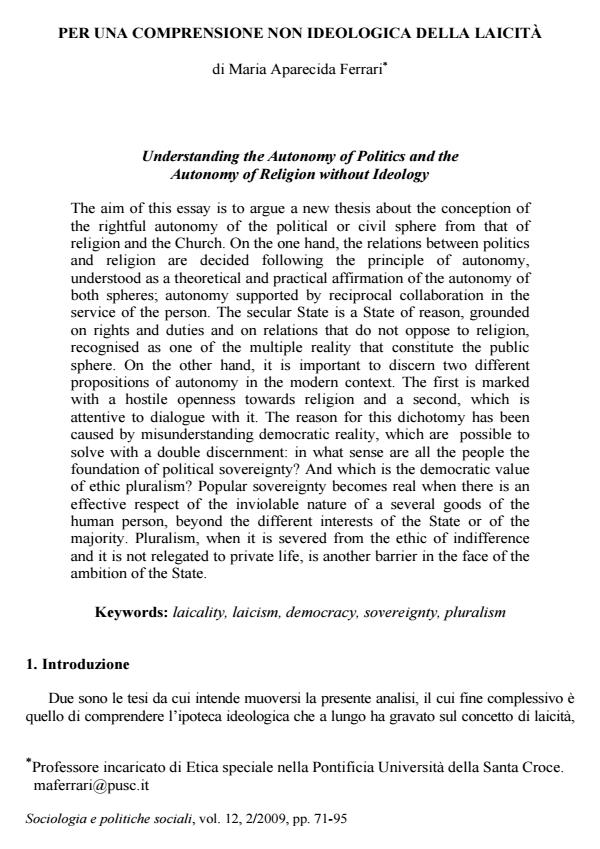Per una comprensione non ideologica della laicità
Titolo Rivista SOCIOLOGIA E POLITICHE SOCIALI
Autori/Curatori Ferrari Maria Aparecida
Anno di pubblicazione 2009 Fascicolo 2009/2
Lingua Italiano Numero pagine 25 P. 71-95 Dimensione file 247 KB
DOI 10.3280/SP2009-002006
Il DOI è il codice a barre della proprietà intellettuale: per saperne di più
clicca qui
Qui sotto puoi vedere in anteprima la prima pagina di questo articolo.
Se questo articolo ti interessa, lo puoi acquistare (e scaricare in formato pdf) seguendo le facili indicazioni per acquistare il download credit. Acquista Download Credits per scaricare questo Articolo in formato PDF

FrancoAngeli è membro della Publishers International Linking Association, Inc (PILA), associazione indipendente e non profit per facilitare (attraverso i servizi tecnologici implementati da CrossRef.org) l’accesso degli studiosi ai contenuti digitali nelle pubblicazioni professionali e scientifiche.
Understanding the Autonomy of Politics and the Autonomy of Religion without Ideology - The aim of this essay is to argue a new thesis about the conception of the rightful autonomy of the political or civil sphere from that of religion and the Church. On the one hand, the relations between politics and religion are decided following the principle of autonomy, understood as a theoretical and practical affirmation of the autonomy of both spheres; autonomy supported by reciprocal collaboration in the service of the person. The secular State is a State of reason, grounded on rights and duties and on relations that do not oppose to religion, recognised as one of the multiple reality that constitute the public sphere. On the other hand, it is important to discern two different propositions of autonomy in the modern context. The first is marked with a hostile openness towards religion and a second, which is attentive to dialogue with it. The reason for this dichotomy has been caused by misunderstanding democratic reality, which are possible to solve with a double discernment: in what sense are all the people the foundation of political sovereignty? And which is the democratic value of ethic pluralism? Popular sovereignty becomes real when there is an effective respect of the inviolable nature of a several goods of the human person, beyond the different interests of the State or of the majority. Pluralism, when it is severed from the ethic of indifference and it is not relegated to private life, is another barrier in the face of the ambition of the State.
Keywords: laicality, laicism, democracy, sovereignty, pluralism
Ferrari Maria Aparecida, Per una comprensione non ideologica della laicità in "SOCIOLOGIA E POLITICHE SOCIALI" 2/2009, pp 71-95, DOI: 10.3280/SP2009-002006